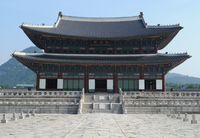
Back بايكتشي اللاحقة Arabic یئنی باکجه AZB بایکجیی نوێ CKB Hubaekje Danish Hubaekje Spanish بکجه نو Persian Hubaekje ID Hubaekje Italian 後百済 Japanese Hubaekje JV
This article needs additional citations for verification. (February 2022) |
Later Baekje 후백제 (後百濟) Hubaekje 백제 (百濟) Baekje | |||||||||
|---|---|---|---|---|---|---|---|---|---|
| 892–936 | |||||||||
 Later Baekje (in green) in 915 | |||||||||
| Capital | Wansanju | ||||||||
| Common languages | Old Korean, Classical Chinese (literary) | ||||||||
| Religion | Buddhism, Confucianism, Taoism, Shamanism | ||||||||
| Government | Monarchy | ||||||||
| King | |||||||||
• 892–935 | Kyŏn Hwŏn (first) | ||||||||
• 935–936 | Kyŏn Sin-gŏm (last) | ||||||||
| History | |||||||||
• Establishment | 892 | ||||||||
• Fall | 936 | ||||||||
| |||||||||
| Today part of | South Korea | ||||||||
| Later Baekje | |
| Hangul | 후백제 |
|---|---|
| Hanja | |
| Revised Romanization | Hu-baekje |
| McCune–Reischauer | Hu-paekche |
| History of Korea |
|---|
 |
| Timeline |
|
|
Later Baekje (Korean: 후백제; Hanja: 後百濟; RR: Hubaekje, Korean pronunciation: [hu.bɛk̚.t͈ɕe]) was one of the Later Three Kingdoms of Korea, along with Taebong and Silla. Later Baekje was a Korean dynastic kingdom founded by the disaffected Silla general Kyŏn Hwŏn in 900, whom led the local gentry and populace that were in large Baekje descent holding onto their collective consciousness until the twilight days of Later Silla.[1] With the former Silla general declaring the revival of the Baekje kingdom of old, the Baekje refugees from the old territories and a portion of the Rank Six Nobility from Silla seeking the opportunity of rising up the ranks gathered under his leadership.[2] Led by the charismatic and capable Kyŏn Hwŏn who was also a competent field commander, Later Baekje in its early days was advantageous in the power game against the newly found kingdom Goryeo and the declining Silla. However, despite its fertile territories in the Jeolla Province and capable military prowess, it eventually fell to Wang Kŏn's Goryeo army in 936 due to political strife and Kyŏn Hwŏn 's defection towards Goryeo. Its capital was at Jeonju, in present-day North Jeolla province.[3]
- ^ Cho, In-Sung (2018). "From Unification to Division : on the Background of the Formation of Later Baekje". Silla History Society. 42: 1–31.
- ^ Bae, Jae-Hoon (2021). "The situation of the Gyeonhwon government in Mujinju". Ancient Korean Historical Studies. 103: 299–336.
- ^ Cho, Beop-jong (2003). "Studies on the Four-Spirit Belief(四靈) in the Jeonju(全州), the Capital of Hubaekje(後百濟)". Ancient Korean Historical Studies. 29: 191–218.